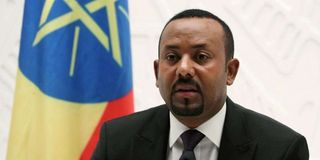Premium
Ethiopia restores partial internet access

Ehiopian Prime Minister Abiy Ahmed. PHOTO | FILE | AFP
What you need to know:
- The incident triggered a total internet shutdown that has been in place since June 29, a move the Ethiopian government said has helped to control the situation.
- Amid the shutdown across the country, only foreign diplomatic missions and embassies, government institutions and continental and regional organisations had access to the internet.
- The Ethiopian government restored WIFI and broadband internet access in the early hours of Wednesday.
The Ethiopian government on Wednesday restored partial access to the internet after a total shutdown since June 29 following deadly unrest that erupted in the capital Addis Ababa and other parts of the country killing at least 239 people.
Deadly protests erupted in the Ethiopian capital, Addis Ababa, as well as various cities and towns in Ethiopia's largest Oromia Regional State during the past week, as protestors went violent following a public outrage attributed to the killing of a popular Oromo singer Hachalu Hundessa, who was killed on June 29 by unknown people in Addis Ababa.
The incident triggered a total internet shutdown that has been in place since June 29, a move the Ethiopian government said has helped to control the situation and curb unwanted destruction by violent protestors who have "hidden personal agenda."
Amid the shutdown across the country, only foreign diplomatic missions and embassies, government institutions and continental and regional organisations had access to the internet.
The Ethiopian government restored WIFI and broadband internet access in the early hours of Wednesday as normalcy returned across almost all the unrest-hit parts of the East African country, according to police.
According to the Ethiopian Police Commission, the public has returned to its normal day-to-day activities in all the unrest-hit parts of the country after government security forces fully controlled the situation and brought back law and order since last week.
Girma Gelam, Oromia region's police deputy commissioner, told state media outlets last week that 156 people have died in the riots, including 11 members of security forces.
In addition to the 156 people who were killed across cities and towns in the Oromia region, police in the East African country's capital Addis Ababa had also reported 10 casualties, including eight civilians and two police officers, as a result of deadly unrests in the city mainly on June 29 and July 1.
According to the Oromia Regional State Police Commission, more than 3,500 suspects have been arrested for alleged involvements in the killing of civilians, destruction and vandalism of public and private properties across the region.
The Ethiopian government said that "destructive elements" had used the death of the popular Oromo singer, Hundessa, to instigate inter-ethnic violence both in the capital Addis Ababa and elsewhere in the East African country.
The government also vowed to bring individuals behind the death of the popular singer to justice as well as groups that are believed to have orchestrated the deadly violence in the capital as well as other cities and towns in Oromia regional.
Ethiopian police forces had also disclosed the arrest of prominent Oromo politicians and activists for alleged involvement in utilising the incident as a means to provoke inter-ethnic attacks both in Addis Ababa and other parts of the country.
Among the detained prominent Oromo politicians and activists include an Oromo media mogul and activist Jawar Mohammed as well as an opposition political party leader, Bekele Gerba.
Ethiopian Prime Minister, Abiy Ahmed, in a televised address to the public in aftermath of the incident also urged the public to remain calm and cooperate with security forces to avert destructive activities and restore peace in the affected areas.
The Ethiopian premier also accused individuals with a "hidden agenda" of utilising the death of the popular ethnic-Oromo singer Hundessa to initiate public rage among the singer's supporters that would eventually bring about subsequent destructive activities.
According to Ahmed, the incident was mainly orchestrated to satisfy "personal ambitions," which goes as far as instigating enter-ethnic violence and crippling the East African country's governance structure.





